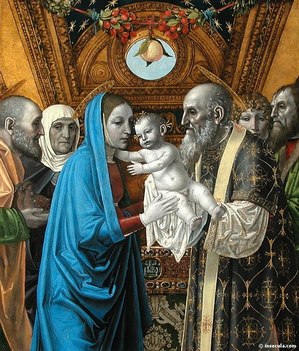We are 40 days away from the Nativity of the Lord. The Presentation of the Lord is a feast the Church in the Eastern part of the ecclesial world, known as an “Encounter,” a second epiphany of the new born King and Messiah given the words of the Simeon. Christ is identified as the Light of the Nations.
The Christology of the Liturgy is quite clear and instructive: by no other person is salvation possible. By the same token this Light to the Nations is a supreme sign of contradiction (St Cyril of Jerusalem) and a stumbling block (St Paul)
The feast began to observed in the 6th century. The Western Church made this feast more penitential because it began to be linked with the purification of Mary according to the Mosaic law.
In the Missal of Blessed John XXIII today ends the Christmas season whereas in the Missal of Paul VI the feast of the Baptism of the Lord ends Christmas.
Our liturgical observance of the Lord’s Presentation is also called “Candlemas” because the Church blesses candles, all the candles to be used in the Mass, including the Paschal Candle to be used at the Easter Vigil; home candles are also brought to church for this blessing. Besides the special prayers prayed, Simeon’s song Nunc dimittis, Saint John of Damascus’ song Adorna thalamum tuum, Sion AND Zacharia’s Benedictus are sung by the choir. Christ as the light of the world is not merely a theological statement, it is a reality in the life of the Christian. To what end do we reflect the light of Christ in the home, in the workplace, in social settings?
V. Zion, let your wedding chamber be prepared to receive Christ your King.
R. The Virgin conceived and gave birth to a son, yet she remained a virgin for ever. She knelt in worship before her child.
V. Simeon took the child in his arms and gave praise and thanks to God.
R. The Virgin conceived and gave birth to a son, yet she remained a virgin for ever. She knelt in worship before her child.
Ave, Mary full of grace
In whose virgin arms’ embrace
God to God Himself doth vow!
Alleluia, alleluia!
Let me in the temple wait,
Jesu, for mine all art Thou.
God is to His temple come;
Angels throng the hallowed dome;
What beyond hath heav’n in store?
Alleluia, alleluia!
God Himself our flesh doth wear;
This than heav’n itself is more.
Incense gales of gladness rise
Where this morning sacrifice
‘Mid re-echoing shouts is made.
Alleluia, alleluia!
Evening’s rite in tears shall end,
On the dark’ning Cross displayed.
There behold th’Oblation wrought,
By Whose precious ransom bought,
We are all to God made nigh.
Alleluia, alleluia!
Now no longer, Lord, our own,
Thine we live and Thine we die!
Let Thy servants now depart;
May we see Thee as Thou art,
Nought of earth arrest our eyes!
Alleluia, alleluia!
Let us here with Jesus grow,
And in Him hereafter rise!
A sequence from an 18th century Paris Missal
